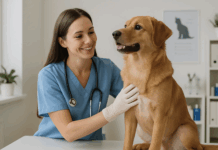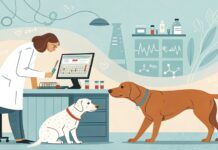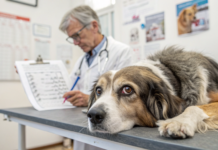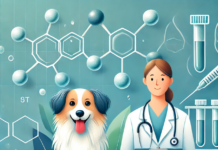Last Updated on July 5, 2023 by Dogs Vets
10 Most Common Animal Diseases Caused by Bacterial or Viral Infections
Bacterial and infections are most common in animals, affecting numerous animal species and causing multiple diseases. different types of bacterial or viral infections can cause the most common animal diseases that will eventually affect animal health and well-being.
Bacterial and viral infections occur when harmful bacteria invade the animal body, leading to life-threatening diseases. Furthermore, these diseases can affect the different body organs resulting in a wide range of symptoms.
Various bacterial or viral animal diseases include anthrax, tuberculosis, and brucellosis. Ultimately, these diseases significantly impact livestock, pets, poultry farms, and wildlife.
Let’s start on the blog to discover the most common animal diseases, their causes, symptoms, and treatment. Keep Reading the blog if you a pet or animal owner to learn helpful information.
Most Common Veterinary Diseases List and Their Health Solution
Bacterial or viral infections cause several veterinary diseases that drastically impact animal health. It’s necessary to know for every pet owner or veterinarian to look at the most prevailing diseases and find the best animal health solution.
Moreover, it’s essential to note how bacterial and viral infections can impact social and economic implications, reducing livestock productivity, increasing the cost of disease control measures, and losing valuable animals. For this
Let’s uncover the typical veterinary disease list, usually caused by bacteria or viruses, their causes, and treatment, ultimately improving the animal’s health and well-being.
Anthrax In Animals
Anthrax in animals is the most common disease caused by the bacteria Bacillus anthracis. This bacteria is usually found in soil and infect animal species through inhalation of spores and ingestion.
Symptoms:
This animal disease mostly shows these symptoms, which can easily be curable if veternarian or pet owners can diagnose this earlier.
Sudden Death
- Difficulty in Breathing
- Swelling and Bleeding
- High fever
- Sudden Death
Treatment:
Antibiotics like Penicillin are the best supportive care for the infected animal.
Brucellosis and its causes
This bacterial infection can cause severe animal health issues, and its causative agent is Brucella bacteria. This bacteria is transmitted in animals through the consumption of contaminated products, contact with infected animals, or exposure to contaminated environments.
Symptoms:
underlying symptoms show that your pet friend is suffering from this bacterial infection, which can drop the negative impacts if animals are suffering from this.
- Abortion
- Decreases Milk production
- Joint Inflammation
- Fever and Infertility
Treatment:
The best treatment with proper diagnosis is essential, so, Antibiotics such as doxycycline and culling are best for infected animals.
Rabies Viral Disease In Animals
This disease is compelled by the rabies virus in animals, transmitted through the infected animal’s bite. This viral infection can prevail in animal bodies and can be life-threatening.
Symptoms:
- Behavioral Changes,
- Excessive salivation,
- Aggression
- Paralysis
Treatment:
Mostly no cure, just symptoms that appear on the animal’s body. Instead of antibiotics, vaccination is necessary for prevention. In most cases, prophylaxis is given to individuals who have been detected with this virus.
Foot-and-Mouth Disease (FMD)
This virus mainly affects cloven-hoofed animals such as pigs, cattle, goats, and sheep. This virus gradually invades the body parts and ultimately stops functioning, which causes death.
Symptoms:
- Blisters and Sores on the Mouth,
- Fever and Hooves,
- Lameness and weight loss,
- Decreased milk production
Treatment:
There is no particular treatment for this disease. Although Infected animals can be quarantined, control measures include proper hygiene protocols, vaccination, and movement restrictions.
Avian Influenza
This viral infection mainly occurs in birds and is caused by numerous strains of influenza viruses. This viral infection is diagnosed through laboratory testing, swabs, and serological tests.
Symptoms:
- Respiratory issues occurred
- Coughing and Sneezing,
- Difficulty Breathing
- Reducing Egg production,
- Diarrhea and Sudden Death
Treatment:
No specific or detailed treatment for viral infection. Infected birds are often culled to control the spread of the disease. However, strict biosecurity measures and vaccination are operated for prevention.
Canine Distemper
This viral disease is primarily caused due to canine Distemper, which mainly affects the dog species and other carnivores. This virus can be diagnosed through clinical signs, blood or tissue samples.
Symptoms:
- Respiratory Issues
- Fever, Coughing
- Sneezing and Nasal Discharge
- Vomiting Diarrhea
- Skin Inflammation
Treatment:
Required Supportive care, including a nutritious diet and symptomatic treatment. Prevention through vaccination is necessary.
Canine Parvovirus:
This viral disease is primarily common in dogs, especially in puppies, are caused due to canine parvovirus. Moreover, this is detected through laboratory testing like fecal and serological tests.
Symptoms:
- Severe Vomiting
- Diarrhea (Often Bloody)
- Dehydration
- Lethargy and Fever
- Reduced Apetide
Treatment:
Extensive supportive care includes antiemetics, fluid therapy, antibiotics, and secondary infection control. Vaccination is vital for protection.
Clostridial infections
Cause: Caused by various species of Clostridium bacteria, commonly present in the environment and gastrointestinal tract.
Symptoms: Vary depending on the specific infection. Examples include muscle stiffness (tetanus), severe swelling (blackleg), and digestive disturbances (enterotoxemia).
Treatment: Treatment varies depending on the specific infection and may involve antibiotics, antitoxins, wound care, and supportive therapy
Salmonellosis
This disease is caused due to bacteria Salmonellosis, which is transmitted in animals through the intake of contaminated water and food or contact with infected animals.
Symptoms:
- Diarrhea and fever
- abdominal pain
- dehydration
- Decreasing appetite.
Treatment:
Fluid therapy and antibiotics Such as ampicillin, enrofloxacin, and supportive care.
Pasteurellosis
This viral infection prevails in an animal’s body and affects its health. the causative agent is bacteria like pasteurellosis. It is usually caused by direct contact of infected animals.
Symptoms:
- Respiratory distress
- pneumonia
- Septicemia and fever
- swollen lymph nodes
Treatment:
Antibiotics Such as penicillin, enrofloxacin, and supportive care.
Conclusion
There are various animal health diseases which are drastically affected the animal’s health and ultimately cause death.
Animal loss hurts the economy, food production, and many other things. So, observing these common animal health diseases, their causes, and animal health solution is essential.
At Vet and Tech, We deliver more accurate and authentic data about veterinary animal diseases, which mainly helps you to grow productively.
Moreover, you can search and explore valuable information about dogs, cats, ferrets, and animal diseases. Get insight into the most common animal disorders, their preventive measures, and the best treatments allowing you to deliver top-quality patient care.
Join and stay with this journey and promote a healthier life for your beloved pets!
Frequently Asked Questions (FAQs)
What are the most common causes of diseases in animals?
Diseases in animals can be caused due to several factors, such as bacteria, viruses, fungi, parasites, chemical poisons, nutritional deficiencies, and contaminated food.
What are the Best Preventive measures to control these diseases in animals?
Proper Vaccination of Animals, good hygienic practices, proper sanitation, and stay quarantine of the infected animals.
Fact Check
We hope you enjoyed reading this article. What are your thoughts on the topic?
“At [Dogsvets.com], our goal is to bring you the most accurate and up-to-date information on all things pet-related.
If you have any additional insights or would like to advertise with us, don’t hesitate to get in touch.
If you notice any errors or discrepancies in our content, please let us know so we can correct them.
We welcome your feedback and encourage you to share this article with others.”























